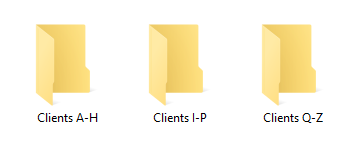Keeping Your Office Computer Clean: Tips and Tricks
22nd August 2016Organisation is key for any successful office and office worker. Your office computer is the centre of your work, so it’s important to keep it clean and organised to ensure that your job goes as smoothly as possible.
This month, we’re taking a look at some of the things you can do to ensure that your office computer is much easier to work with during those long days at the office.
Keep your equipment clean
Before you get down to the nitty gritty of figuring out how to sort out and clean up all the loose files on your desktop and in your folders, you should spend some time making the external parts of your office computer as clean as possible so that actually using your computer isn’t an unpleasant experience.
Keyboard cleaning: The keyboard is prone to collecting an immense amount of dirt. From dust and hair to food particles and stains, your keyboard can end up looking and feeling quite nightmarish. You can take simple steps to clean it lightly, by turning it upside down and shaking it, or you can use compressed air aimed between keys to kick up trapped dirt. If you want to be more thorough, you can always remove individual keys and clean them and the surface underneath before replacing them. Always make sure to unplug your keyboard before attempting to clean it in any way.
Mouse Cleaning: A dirty mouse can become unresponsive or harder to operate, making your work much slower and laborious. The best method of cleaning an optical mouse is spraying compressed air around the sensor. You can use a damp cloth on the outside of the mouse if it’s greasy or stained, but avoid wiping the sensor directly, so as to avoid damaging it. Again, unplug your mouse from the computer before cleaning.
Screen cleaning: LED or LCD monitors can become harder to read if they have become smudged or stained, and will require special cleaning procedures. Use a soft microfibre cloth to clear the screen from fingerprints or dirt. If a dry cloth doesn’t work, you can try dampening the cloth with distilled water. Make sure to unplug your monitor and wait until it is cool to the touch before cleaning.
Organising your files
It can be frustrating to save something one second then have no idea where it is the next. An unorganised filing system serves only to make your job tougher and slower, so smartly organising all your files is critical.
Desktop: Generally, you only want to reserve your desktop for the important stuff only. Making your desktop the one stop shop for every file you download will lead it to becoming an ugly, impossible to navigate mess. Have a look at your desktop and find other places for any loose files, old files you haven’t touched for some time, temporary files and program installers. Also, for anything you download in the future, make sure your desktop isn’t the default download location.
Have a clean out: Duplicate, unused or unnecessary files can mount up and will impede upon the performance of your computer over time. Check your downloads folder for old files you downloaded months ago but forgot about, and get rid of any that you no longer need. Do the same for your documents folder and even your picture, music and video libraries – who knows what you might still have saved in there? Email attachments can easily duplicate, so keep an eye out for those and, once you’ve sent everything you can to the recycle bin, make sure to empty it to finish the job.

Implement a system: It can be daunting to strictly sort out everything on your computer, but it’s a lot less daunting than traipsing through file after file individually until you find the one you want. Folders are your friends – and so are sub-folders – so get into the habit of creating clearly labelled folders for documents of the same type or ones belonging to the same sector. An example would be creating folders for different clients, then subfolders for things like financial documents, visual documents, and records – among others.
As part of your system, name each document properly. Short names which give an immediate description as to the contents are the best, and means you don’t have to open fifty different documents to check what each one is about.
Internet cleaning: The internet is relied upon a lot in every business, so making it easy to navigate is essential. Organise your bookmarks, deleting old or broken ones as necessary, and clean out your browser cache to purge all accumulated junk files and clutter that you gather on your journeys around the web. Also take some time to clean up your email client. Empty the junk folder, create folders for clients, co-workers etc, and get rid of old ‘sent’ emails you no longer need to save. Performing a thorough email cleanout is especially important for cloud based email clients, as you’ll be freeing up your usage space as you go.
Indos Computer Services provide expert, easy to understand IT support and services to local small and medium-sized businesses across St Albans, Watford and Hemel Hempstead. For friendly support from an experienced and reliable team, don’t hesitate to get in touch with us today.
This entry was posted in Tips. Bookmark the permalink. ← Keep your Head in the Clouds: Cloud Services Explained How to Keep Your Computer Cool →


